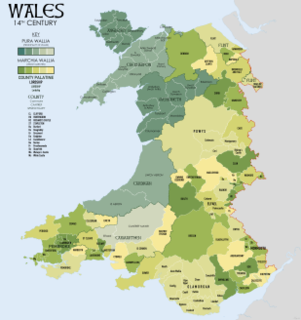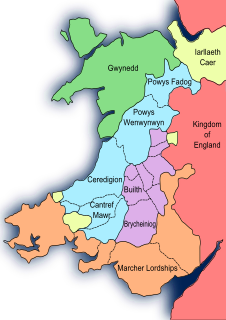Related Research Articles

Owain ap Gruffydd, commonly known as Owain Glyndŵr or Glyn Dŵr, was a Welsh leader, soldier and military commander who led a long-running Welsh War of Independence with the aim of ending English rule in Wales during the Late Middle Ages. He was also an educated lawyer and formed the first Welsh Parliament, and he was the last native-born Welshman to hold the title Prince of Wales.

Welsh is a Celtic language of the Brittonic subgroup that is native to the Welsh people. Welsh is spoken natively in Wales, by some in England, and in Y Wladfa. Historically, it has also been known in English as "British", "Cambrian", "Cambric" and "Cymric".

Prince of Wales is a title traditionally given to the heir apparent to the English and later British throne. Before Edward I's conquest in the 13th century, it was used by the rulers of independent Wales.

Princess of Wales is a courtesy title used since the 14th century by the wife of the heir apparent to the English and later British throne. The current title-holder is Catherine, wife of William, Prince of Wales.

Wales is a country that is part of the United Kingdom. It is bordered by England to the east, the Irish Sea to the north and west, the Celtic Sea to the south west and the Bristol Channel to the south. It had a population in 2021 of 3,107,500 and has a total area of 20,779 km2 (8,023 sq mi). Wales has over 1,680 miles (2,700 km) of coastline and is largely mountainous with its higher peaks in the north and central areas, including Snowdon, its highest summit. The country lies within the north temperate zone and has a changeable, maritime climate. The capital and largest city is Cardiff.

A Marcher lord was a noble appointed by the king of England to guard the border between England and Wales.

Gwynfor Richard Evans was a Welsh politician, lawyer and author. He was President of the Welsh political party Plaid Cymru for thirty-six years and was the first Member of Parliament to represent it at Westminster, which he did twice, from 1966 to 1970, and again from 1974 to 1979.

Welsh nationalism emphasises and celebrates the distinctiveness of Welsh culture and Wales as a nation or country. Welsh nationalism may also include calls for further autonomy or self determination which includes Welsh devolution, meaning increased powers for the Senedd, or full Welsh independence.

Pan-Celticism, also known as Celticism or Celtic nationalism is a political, social and cultural movement advocating solidarity and cooperation between Celtic nations and the modern Celts in Northwestern Europe. Some pan-Celtic organisations advocate the Celtic nations seceding from the United Kingdom and France and forming their own separate federal state together, while others simply advocate very close cooperation between independent sovereign Celtic nations, in the form of Breton nationalism, Cornish nationalism, Irish nationalism, Manx nationalism, Scottish nationalism, and Welsh nationalism.

The Principality of Wales was originally the territory of the native Welsh princes of the House of Aberffraw from 1216 to 1283, encompassing two-thirds of modern Wales during its height of 1267–1277. Following the conquest of Wales by Edward I of England of 1277 to 1283, those parts of Wales retained under the direct control of the English crown, principally in the north and west of the country, were re-constituted as a new Principality of Wales and ruled either by the monarch or the monarch's heir though not formally incorporated into the Kingdom of England. This was ultimately accomplished with the Laws in Wales Acts 1535–1542 when the Principality ceased to exist as a separate entity.

The Welsh Not was a token used by teachers at some schools in Wales in the 19th century to discourage children from speaking Welsh at school, by marking out those who were heard speaking the language. Accounts suggest that its form and the nature of its use could vary from place to place, but the most common form was a piece of wood suspended on a string that was put around the child's neck. Other terms used historically include Welsh knot, Welsh note, Welsh lump, Welsh stick, cwstom, Welsh Mark, and Welsh Ticket.

Welsh republicanism or republicanism in Wales is the political ideology of a Welsh republic, as opposed to Wales being presided over by the monarchy of the United Kingdom.
This article is about the particular significance of the year 1903 to Wales and its people.

British people or Britons, also known colloquially as Brits, are the citizens of the United Kingdom of Great Britain and Northern Ireland, the British Overseas Territories, and the Crown dependencies. British nationality law governs modern British citizenship and nationality, which can be acquired, for instance, by descent from British nationals. When used in a historical context, "British" or "Britons" can refer to the Ancient Britons, the indigenous inhabitants of Great Britain and Brittany, whose surviving members are the modern Welsh people, Cornish people, and Bretons. It also refers to citizens of the former British Empire, who settled in the country prior to 1973, and hold neither UK citizenship nor nationality.

Welsh-language literature has been produced continuously since the emergence of Welsh from Brythonic as a distinct language in around the 5th century AD. The earliest Welsh literature was poetry, which was extremely intricate in form from its earliest known examples, a tradition sustained today. Poetry was followed by the first British prose literature in the 11th century. Welsh-language literature has repeatedly played a major part in the self-assertion of Wales and its people. It continues to be held in the highest regard, as evidenced by the size and enthusiasm of the audiences attending the annual National Eisteddfod of Wales, probably the largest amateur arts festival in Europe, which crowns the literary prize winners in a dignified ceremony.

The conquest of Wales by Edward I took place between 1277 and 1283. It is sometimes referred to as the Edwardian Conquest of Wales, to distinguish it from the earlier Norman conquest of Wales. In two campaigns, in 1277 and 1282–83, respectively, Edward I of England first greatly reduced the territory of Llywelyn ap Gruffudd, and then completely overran it, as well as the other remaining Welsh principalities.

Women's suffrage in Wales has historically been marginalised due to the prominence of societies and political groups in England which led the reform for women throughout the United Kingdom. Due to differing social structures and a heavily industrialised working-class society, the growth of a national movement in Wales grew but then stuttered in the late nineteenth century in comparison with that of England. Nevertheless, distinct Welsh groups and individuals rose to prominence and were vocal in the rise of suffrage in Wales and the rest of Great Britain.

Welsh cuisine encompasses the cooking styles, traditions and recipes associated with Wales. While there are many dishes that can be considered Welsh due to their ingredients and/or history, dishes such as cawl, Welsh rarebit, laverbread, Welsh cakes, bara brith and Glamorgan sausage have all been regarded as symbols of Welsh food. Some variation in dishes exists across the country, with notable differences existing in the Gower Peninsula, a historically isolated rural area which developed self-sufficiency in food production.

This is a timeline of Welsh history, comprising important legal and territorial changes, and political events in Wales.

This is a bibliography of published works on the history of Wales. It includes published books, journals, and educational and academic history-related websites; it does not include self-published works, blogs or user-edited sites. Works may cover aspects of Welsh history inclusively or exclusively.
References
- ↑ Barberis, Peter; McHugh, John; Tyldesley, Mike (1 January 2000). Encyclopedia of British and Irish Political Organizations: Parties, Groups and Movements of the 20th Century. A&C Black. p. 519. ISBN 978-0-8264-5814-8.
- ↑ Jenkins, Philip (13 October 2014). A History of Modern Wales 1536-1990. Routledge. p. 405. ISBN 978-1-317-87269-6.
- ↑ Canadian Review of Studies in Nationalism: Revue Canadienne Des Études Sur Le Nationalisme. University of Prince Edward Island. 1998. p. 133.